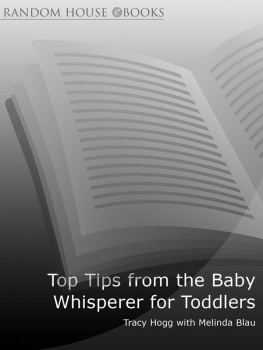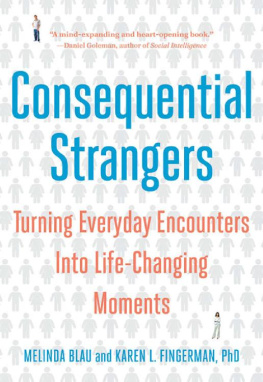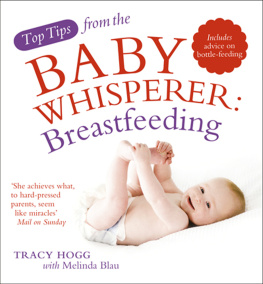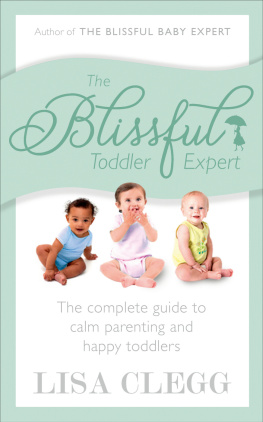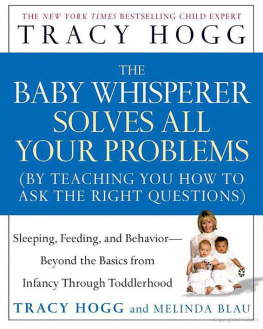Top Tips
from the
Baby Whisperer
for Toddlers
Secrets to Raising Happy
and Cooperative Toddlers
Tracy Hogg
with Melinda Blau

This eBook is copyright material and must not be copied, reproduced, transferred, distributed, leased, licensed or publicly performed or used in any way except as specifically permitted in writing by the publishers, as allowed under the terms and conditions under which it was purchased or as strictly permitted by applicable copyright law. Any unauthorised distribution or use of this text may be a direct infringement of the authors and publishers rights and those responsible may be liable in law accordingly.
Version 1.0
Epub ISBN 9781409004004
www.randomhouse.co.uk
1 3 5 7 9 10 8 6 4 2
Published in 2008 by Vermilion, an imprint of Ebury Publishing
Ebury Publishing is a Random House Group company
Copyright Tracy Hogg Enterprises, Inc. 2001
Tracy Hogg has asserted her right to be identified as the author of this Work in accordance with the Copyright, Designs and Patents Act 1988
All rights reserved. No part of this publication may be reproduced, stored in a retrieval system, or transmitted in any form or by any means, electronic, mechanical, photocopying, recording or otherwise, without the prior permission of the copyright owner
The Random House Group Limited Reg. No. 954009
Addresses for companies within the Random House Group can be found at www.rbooks.co.uk
A CIP catalogue record for this book is available from the British Library

The Random House Group Limited supports The Forest Stewardship Council (FSC), the leading international forest certification organisation. All our titles that are printed on Greenpeace approved FSC certified paper carry the FSC logo. Our paper procurement policy can be found at www.rbooks.co.uk/environment
Typeset by SX DTP, Rayleigh, Essex
Printed and bound in Great Britain by Mackays of Chatham plc, Chatham, Kent
ISBN 978 0 09 191743 2
Copies are available at special rates for bulk orders. Contact the sales development team on 020 7840 8487 for more information.
To buy books by your favourite authors and register for offers, visit www.rbooks.co.uk
The information given in this book should not be treated as a substitute for qualified medical advice; always consult a medical practitioner. Neither the authors nor the publisher can be held responsible for any loss or claim arising out of the use, or misuse, of the suggestions made or the failure to take medical advice.
Contents
Introduction
The Challenge of Toddlerhood
Welcome to what is probably the most strenuous and awe-inspiring stage of parenting.
The dictionary defines a toddler as a small child roughly between the ages of one and three. Other books mark this phase of childhood when a baby first begins to toddle, or walk with short, unsteady steps. For some, this can be as young as eight or nine months. Either way, trust me, if you have a toddler on your hands, you know it, no matter what a book tells you.
Baby Whispering: The Foundation of Good Parenting
Having cared for over 5,000 babies, I fine-tuned what one of my clients dubbed baby whispering. Its quite like what a horse whisperer does, but here were talking about infants. In both cases, were dealing with sensate creatures, living beings who cant actually talk but express themselves nevertheless. In order to care for and connect with them, we must learn their language. Hence, baby whispering means tuning in, observing, listening and understanding whats happening from the childs perspective.
If you have already read Secrets of the Baby Whisperer, the following will be familiar. Think of it as a refresher course.
Every child is an individual
From the day a baby is born, she has a unique personality, as well as likes and dislikes of her own. Therefore no one strategy works for all. You have to find out whats right for your toddler.
Every child deserves respect and must learn to respect others as well
We need to draw what I call a circle of respect around each child an invisible boundary beyond which we dont go without asking permission or explaining what were about to do.
Children at this age can be rather demanding and obstinate, and they have to learn to respect us as well. In these pages, Ill teach you how to respect your toddler and meet her needs without compromising your own boundaries.
Take the time to observe, listen and talk with children, not at them
The process of getting to know your child starts the day he comes into the world. By observing, we begin to understand a toddlers unique temperament. By listening to him, even before he acquires spoken language, we begin to know what he wants. And by having a dialogue conversing rather than lecturing we allow the child to express who he really is.
Every child needs a structured routine, which gives her life predictability and safety
As parents and caretakers, we provide consistency and safety through ritual, routines and rules. Its a paradox of sorts, allowing a child to explore and simultaneously making sure she knows that she has to live within the safe confines we create for her.
The above simple, down-to-earth guidelines provide the foundation upon which a solid family is built. Children thrive when they are listened to, understood and treated with respect. They thrive when they know whats expected of them and what they can expect of the world around them.
My Intentions: The Road to Harmony
Ive outlined below a list of more specific goals which will encourage, teach, and demonstrate through example, how to:
View and respect your toddler as an individual. Rather than categorising him by age, allow him to be who he is.
Cheer your toddler on towards independence without rushing him. To that end, I provide tools that will help you gauge her readiness and teach her practical skills, such as eating, dressing, potty-training and basic hygiene.
Learn how to tune in to your childs verbal and nonverbal language. You must exercise patience and restraint when your child is trying to tell you something and, at the same time, know when to step in and offer your help.
Be realistic toddlerhood is a time of constant change. One of the biggest challenges of parenting a toddler is that just when you get used to a certain kind of behaviour or a particular level of competence bam! your child changes.
Promote your childs development and family harmony. Its critical to create a happy, safe environment that enables a child to venture forth, and, at the same time, keeps him out of harms way and doesnt allow his antics to disrupt the family.
Help your toddler manage her emotions particularly her frustrations. Studies have shown that children as young as 14 months can begin to identify and even anticipate mood (theirs and their caretakers), feel empathy and, as soon as theyre verbal, talk about feelings as well. It is important to remember that emotional skills can be learned and as your toddlers emotional repertoire expands there will be a growing awareness of herself and of social situations.

